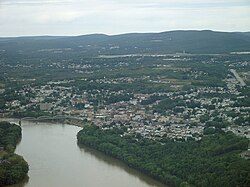Mayor of Pittston, Pennsylvania
| Pittston, Pennsylvania | ||
|---|---|---|
| City | ||

Pittston City aerial view looking northeast.
|
||
|
||
| Nickname(s): The Quality Tomato Capital of the World. | ||
 Location of Pittston in Luzerne County, Pennsylvania. |
||
| Location of Pittston in Luzerne County, Pennsylvania. | ||
| Coordinates: 41°19′26″N 75°47′20″W / 41.32389°N 75.78889°WCoordinates: 41°19′26″N 75°47′20″W / 41.32389°N 75.78889°W | ||
| Country | United States | |
| State | Pennsylvania | |
| County | Luzerne | |
| Region | Greater Pittston | |
| Settled | 1770 | |
| Incorporated (borough) | April 30, 1853 | |
| Incorporated (city) | December 10, 1894 | |
| Government | ||
| • Type | City Council | |
| • Mayor | Jason C. Klush (D) | |
| Area | ||
| • Total | 1.71 sq mi (4.42 km2) | |
| • Land | 1.55 sq mi (4.02 km2) | |
| • Water | 0.15 sq mi (0.40 km2) | |
| Elevation | 653 ft (199 m) | |
| Population (2010) | ||
| • Total | 7,739 | |
| • Estimate (2016) | 7,602 | |
| • Density | 4,901.35/sq mi (1,892.46/km2) | |
| Time zone | Eastern (EST) (UTC-5) | |
| • Summer (DST) | EDT (UTC-4) | |
| Zip codes | 18640-18644 | |
| Area code(s) | 570 & 272 | |
| FIPS code | 42-61048 | |
| Website | City of Pittston, Pennsylvania | |
Pittston is a city in Luzerne County, Pennsylvania, United States. It is situated between Scranton and Wilkes-Barre. The city gained prominence in the late 19th and early 20th centuries as an active anthracite coal mining city, drawing a large portion of its labor force from European immigrants. The population was 7,739 as of the 2010 census, making it the fourth largest city in Luzerne County. At its peak in 1920, the population of Pittston was 18,497. The city consists of three sections: The Downtown (in the center of the city), the Oregon Section (in the southern end), and the Junction (in the northern end). Pittston City is at the heart of the Greater Pittston region (a 65.35 square mile region in Luzerne County). Greater Pittston has a total population of 48,020 (as of 2010).
Pittston lies in the Wyoming Valley on the east side of the Susquehanna River and on the south side of the Lackawanna River. It is approximately midway between Wilkes-Barre and Scranton. Named after the famous British statesman William Pitt the Elder, the city was settled around 1770 by the Susquehanna Company of Connecticut. It was originally called "Pittstown."
During the Revolutionary War, the Wyoming Valley was an active battleground between the British and the Continentals (American Patriots). On July 3, 1778, a force of British soldiers, with the assistance of about 700 Indians, attacked and killed nearly 300 American Patriots (in present-day Wyoming). Connecticut Continentals (Patriots), led by Captain Jeremiah Blanchard and Lieutenant Timothy Keyes, held and maintained a fort in Pittstown (present-day Pittston City). On July 4, 1778 (one day after the Battle of Wyoming), a group of British soldiers took over the fortress and some of it was destroyed. Two years later, the Continentals stormed the fortification and recaptured it. From then on it was under Patriot control until the end of the war in 1783, with the signing of the Treaty of Paris. Today a marker stands at the site where the fort once stood.
...
Wikipedia



